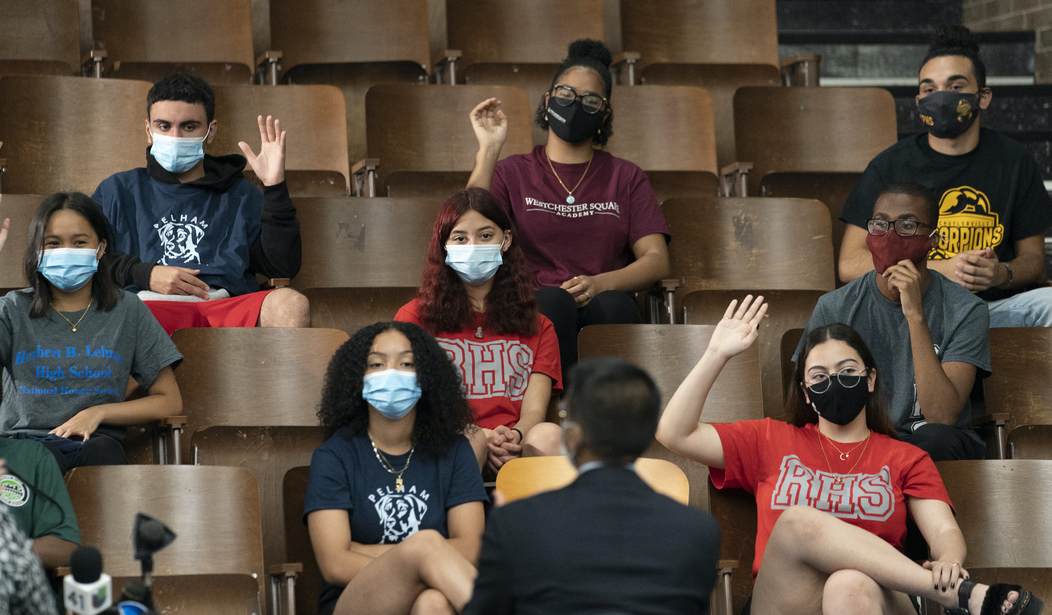Over 300 years ago, English physicist Sir Issac Newton explained in his third law of motion that for every action in nature there is an equal and opposite reaction. That law also describes well the present-day interaction between diversity, equity, and inclusion (DEI) advocates and its opponents.
That was the gist of a recent interview conducted by The Daily Signal of Adam Guillette, president of the investigative reporting organization Accuracy in Media (AIM). AIM sent reporters undercover into a half dozen state colleges in Texas and filmed school officials who, Guillette said, “brag[ged] to us about how they ignored the law” recently passed in Texas to ban DEI. There have been other attempts to restrict DEI in states including Florida, Idaho, Indiana, Kentucky, and West Virginia.
However, as the ensuing colloquy between Messrs. Guilettte and Kinnett makes clear neither gentleman was exactly surprised by the AIM findings. Perhaps they studied physics. Or maybe, just maybe, they live in reality. A reality where, as Mr. Kinnett sarcastically explained, he’s shocked that “schools that staff their entire university with far left-leaning individuals who passionately believe in DEI are ignoring the law.”
But that’s not the full story. Also in the real world, Americans largely oppose race preferences—California, for example, banned them nearly 30 years ago—and so there is widespread opposition to the worst of DEI. At the same time, Americans are somewhat divided on the issue of how best to achieve justice and fairness. Polls indicate a majority support good-sounding DEI initiatives in the workplace and on campus. These results should also come as no surprise.
Recommended
By nearly any objective measure, the American people have done more good for more people than any other group in the history of mankind. They are perceptive to injustice and seek to correct it. It’s one of the reasons America is exceptional.
For example, according to a 2016 analysis, American generosity quantified in the form of donations to charity is three to nine times as much (as a share of GDP) than that of Europeans. The U.S. hosts more immigrants per capita than any other country in the world. And America, as the largest global economy, a longtime leader in technological innovation, and one of the top countries for economic freedom has made it possible for untold millions across the globe to lift themselves out of poverty.
Perhaps the greatest domestic achievement and example of American exceptionalism though was the establishment of the principle that all men are created equal. It is a promissory note enshrined in our founding documents, the Constitution and Declaration of Independence, that would eventually in combination with the bloodiest war in American history snuff out the institution of slavery we inherited from Great Britain.
However, again, in the real world, many understandably believe a bill remains due and owing. A campaign to indiscriminately ban programs, initiatives, and concepts arguably to address our history on race—counterforce to DEI—without making a good case as to why they are bad for everyone is not the most effective method to change hearts and minds and thereby, to achieve long-term success. Even worse if those efforts sweep so broadly that they encompass diversity initiatives that while perhaps eliciting sighs and eyerolls are not otherwise objectionable on principle. That’s more than a waste of time and money, it’s actively counterproductive by provoking an equal and opposite reaction.
We can provide the facts and data, and quibble over to what extent slavery, segregation, and discrimination plays into hardships faced by minorities over generations. That’s serious and important work. But what animates most people is the fact that we have that history and for far too long we are embarrassed as a nation that many descendants of people who suffered under that history face economic and social underachievement today.
We must be specific and persuade our fellow Americans of the dangers of DEI. Doing so also means adopting messages and launching initiatives that will address concerns that America be a just and fair nation that provides opportunities for all. That’s nonnegotiable. As in other areas, University of Florida president Ben Sasse is leading academia in this approach with the recent shuttering of campus DEI offices while announcing a “commitment to universal human dignity.”
The present moment, after the Supreme Court ban on racial affirmative action in higher education, couldn’t be more important. It is an historic opportunity to focus on addressing the root causes—like the lack of healthy two-parent families and poor K-12 education—of racial disparities that have led so many people to good faith support of racial affirmative action and DEI.
We can never waver on our commitment to opposing discrimination. Yet we must strive to explain why DEI programs are harmful and how they conflict with the values and goals that inspired the civil rights movement, led to enormous progress for minorities, and can continue to do so. This is the only way to effectively handle the issue of race in America.

























Join the conversation as a VIP Member